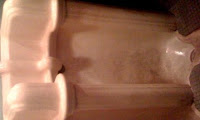
Travelogue 250, November 30
Elliott Park
I’m just a block or two away from my neighborhood, the one I want to live in. My address is on Elliott Avenue, so I had assumed I was in Elliott Park. If I’d only landed on the other side of the highway, I’d be there.
That’s Interstate 94 I’m speaking of, the muscle-bound silver river god separating me from downtown. Yes, the cold, white water 94 that conveys me to work every morning. When I get up, I glance out the window to measure the mood of the insomniac beast, watching the tops of trucks being swept along by the flood.
This morning, when I look, Nature’s pulled a prank. I’d been looking forward to a brisk Sunday morning cycle ride at first light through empty downtown streets. But snow has fallen. Everything’s white. My will fails me.
The streets are dry yesterday when I get my urban geography lesson. There’s a café just down Portland, across the great river bed, Father of Carbons, down Portland to Tenth Street. It has an inviting green awning among anonymous, barren blocks of proud new housing and stuttering old housing, all of them signs of the neighborhood’s fortunes.
Apparently, the café is a kind of hinge between old and new. Things were a lot better five years ago, says the café’s co-owner, who is working the counter. She classifies herself as a hippie. Five years ago, Elliott Park stood up to a hippie’s most stringent standards: diversity, arts, a history of neighborhood action, and a lot of potential for improvement.
She looks the part of a hippie, with untamed graying hair, frumpy sweater, and sleepy ways. The café features a tiny, ad hoc shop, partitioned off by its displays, where you can buy locally crafted, beaded and knitted gifts.
There are shelves of used books along the length of one wall. There’s a small stage with a piano in one corner by the window. On most days, the main feature onstage is a TV, usually tuned into permanent jazz. Today it features the concert to celebrate John Mayall’s seventieth birthday party five years ago. Mick Taylor makes a sullen appearance. Clapton shows up. On and on it goes.
So the hippie and friends open this café. They join the Elliott Park community organization. They are players in the heyday of Renaissance planning for this historic district, neglected for so many years, after it was stage-by-stage walled off from the rest of downtown – by General Hospital, which grew into the huge county medical center; by our glorious interstate; and finally by the Metrodome.
Integral to revitalization plans were a couple high-profile condo high-rises. Sadly, condos were everyone’s antidote for the neighborhood blues. So, while the first building has turned out very nicely, and adds a warm touch to a southern view of the skyline, sales in the second development, (right across the street from our café, coincidentally,) have slumped. These days, the café-owner has a dim view of the state of the neighborhood.
She has no plans to move out. In fact, she’s shopping a plan for a non-profit to be based in Elliott Park. This will be called ‘SOMA’, Sounds of Mid-America, and it will be ‘a non-profit museum founded to recognize, celebrate and preserve the diverse music community of Middle America’. It will be home to classes, events and archives.
Let’s wish her well. More power to our cities’ forgotten neighborhoods.

